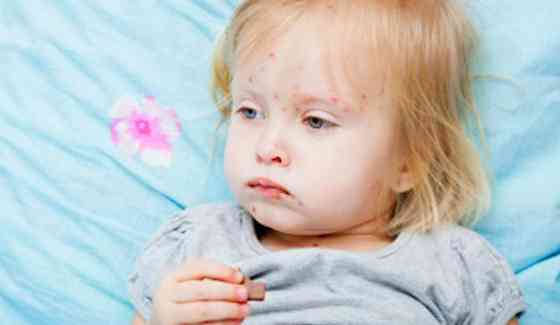- MENU
- HOME
- SEARCH
- WORLD
- MAIN
- AFRICA
- ASIA
- BALKANS
- EUROPE
- LATIN AMERICA
- MIDDLE EAST
- United Kingdom
- United States
- Argentina
- Australia
- Austria
- Benelux
- Brazil
- Canada
- China
- France
- Germany
- Greece
- Hungary
- India
- Indonesia
- Ireland
- Israel
- Italy
- Japan
- Korea
- Mexico
- New Zealand
- Pakistan
- Philippines
- Poland
- Russia
- South Africa
- Spain
- Taiwan
- Turkey
- USA
- BUSINESS
- WEALTH
- STOCKS
- TECH
- HEALTH
- LIFESTYLE
- ENTERTAINMENT
- SPORTS
- RSS
- iHaveNet.com: Health
Denise Foley

Measles was officially eradicated in the U.S. in 2000.
But someone forgot to tell the rubeola virus, the highly contagious organism that causes this once common -- and sometimes deadly -- childhood disease. In fact, the Centers for Disease Control and Prevention recently announced that measles cases were on the rise in the U.S., with more infections in the last year than the previous 15.
Many doctors and parents of young children today have never seen a case of the measles, let alone an outbreak.
But I have seen a measles outbreak, and I do know how serious it is. I got my immunization the hard way: I had the measles. At the age of 8, I spent 10 days in a dark room, delirious with fever, my parents taking turns placing cold washcloths on my head. I recovered, but other children weren't so lucky. They died -- often from pneumonia -- or suffered brain damage as the result of encephalitis, a brain inflammation. About 1 in 10 cases results in ear infections that can cause permanent hearing loss.
Even worse, a rare, frightening complication can occur up to 27 years after a measles infection, particularly in those who contract the disease as babies or young children. Subacute sclerosing panencephalitis (SSPE) is a fatal, progressive disease that is characterized by mental deterioration and neuromuscular disorders that can result in blindness, an inability to walk and a persistent vegetative state. (Read more about it here.)
What You Don't Know About Measles -- But Should
Most cases of measles in the U.S. are imported. Measles epidemics are still rampant in Europe and other parts of the world where immunizations aren't mandatory as they are, with some exceptions, in the U.S. For example, a measles epidemic has been raging in France since 2008. More than 22,000 cases have been reported since it began, more than 700 people developed complications and six have died. About 90 percent of the U.S. measles cases originated overseas.
Aiding and abetting this dangerous rise: a susceptible population. "A lot of it is because of that stupid 1998 paper in The Lancet connecting vaccinations with autism," says Clyde Martin, an expert in health statistics at Texas Tech University. "It has been completely discredited -- the data was falsified -- but people still believe it."
That false study is a major reason why some parents won't have their children immunized. This alarms Martin because of what his numbers are telling him. Martin took a close look at a 1987 measles epidemic in Lubbock, Texas, which was mainly centered at Texas Tech. He examined the medical records of every single student who was affected, and he pored over their vaccination records too.
Many students were vaccinated once the epidemic broke out. But it took a whopping 98 percent of them being immunized to finally stop the epidemic, which drives home the importance of making sure every child gets the vaccine.
It only takes a 30-second exposure at 10 feet to contract the virus.
With some parents and doctors being lax about immunization, says Martin, "it's the making of a disaster."
Eliminating "Personal Belief" Vaccine Exemptions
An easy solution: Eliminate the so-called "personal belief" exemptions to the measles vaccine. The most measles cases have occurred in states with these exemptions that allow parents to opt out of mandatory immunizations because of secular, rather than religious, beliefs. Many of them are based on that one discredited study published in 1998 linking vaccines to autism.
As Martin's study indicates, you need a high percentage of people vaccinated to get what's called "herd immunity" to prevent the spread of the disease. An unvaccinated child who contracts the measles has a five-day symptomless period in which he can infect others, including babies that are too young to be vaccinated who are at high risk of SSPE. (See what can happen to an exposed child here.)
Martin thinks some of those exemptions need to be eliminated, particularly those that are granted because parents believe something to be a scientific fact that isn't. (Read more about the debate here.) "We've got to be stricter on the giving of exemptions," says Martin. "For religious reasons? I have no real problem with that because there aren't that many. Some people can't take the vaccine because they're allergic to eggs, which are used to manufacture it. But 'Because I don't want my kid to have autism' is not acceptable."
Copyright © All rights reserved.
AGING | ALTERNATIVE | AILMENTS | DRUGS | FITNESS | GENETICS | CHILDREN'S | MEN'S | WOMEN'S
Health - Why Deadly Measles Is on the Rise